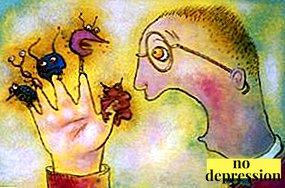Cognitive impairment is among the most common neurological symptoms. The occurrence of such disorders indicates the presence of violations of the brain.
As a result of the progression of the pathological state, a change in the rational knowledge of the world occurs.
Understanding the issue cognitive impairment - what is itIt will be easier if you preliminarily examine information about the causes of these disorders and their symptoms.
Concept and definition

In a broad sense, cognitive impairments are abnormalities in the functions of the human brainresponsible for the cognition, understanding, perception and awareness of certain information obtained from the environment.
In some cases, these disorders are observed in the presence of serious diseases of neurological etiology.
Cognitive impairment can be associated with the following brain functions:
- regulation of arbitrary activity;
- all types of memory;
- gnosis (the assignment of objects to a certain category);
- perception of information;
- concentration of attention;
- intelligence;
- speech activity;
- praxis (ability to apply knowledge in practice);
- psychomotor function.
Deficiency or Deficiency
Cognitive impairment or deficiency is a form of loss of cognitive function.
The degree of symptoms depends on the rate of progression of deviation. First of all, cognitive impairment affects the operational memory, processing speed of the information received, concentration and the ability to quickly change the type of activity.

In the presence of a critical level of violations occurs risk of developing personality disorder and maladjustment person in a social and professional environment.
Stages cognitive deficit:
- Moderate cognitive impairment (tendency to anxiety-depressive states).
- Mild dementia (at home, a person feels better than in a team).
- Dementia moderate (disruption of daily activity, the appearance of the first symptoms of cognitive impairment).
- Severe dementia (manifestation of the main symptoms of cognitive impairment).
Distortion list
Cognitive distortions are systematic errors in thinkingarising in certain situations. Pattern deviations or patterns are examples of mental behavior at the evolutionary level.
Distortions of this type may occur due to the need to adapt to a particular situation or the lack of specific thinking skills.
The elimination of this problem is a separate trend in psychotherapy and the main object in cognitive psychotherapy. Total over 120 cognitive distortions recordeddivided into several groups.

Distortions related to decision making and behavior in certain situations:
- irrational reinforcement (attachment to a direction chosen earlier);
- amplification (when drawing up a plan to achieve the goal, an excessive amount of effort is invested);
- submission to authority (a person is not able to be guided by his own opinion and is subordinate to a specific person who considers himself an authority);
- failure to take in (frustration of loss exceeds the joy of finding the same item);
- and so forth
The distortions which basis are stereotypes:
- the effect of overconfidence (a person greatly overestimates his abilities and skills);
- the illusion of clustering (there is a tendency to see image-schemes where they are absent);
- a cascade of available information (distortion is a collective belief in facts that have been voiced many times);
- telescope effect (wrong orientation in time, recent events are perceived as distant and vice versa);
- the illusory correlation (the presence of an erroneous belief in the interrelation of any events or actions that are not present);
- and so forth
Distortion, due to social environment:
 the halo effect (in the perception of a person, one fact plays a key role, for example, an attractive appearance is associated with an ideal character);
the halo effect (in the perception of a person, one fact plays a key role, for example, an attractive appearance is associated with an ideal character);- distortion in favor of his group (a person listens to the opinion of only those whom he considers to be a member of a certain group);
- distortion of the homogeneous assessment of people from another group (members of their group have a more impressive set of abilities and skills than members of other groups);
- the illusion of transparency (distortion in the overestimation of understanding by other people and the overestimation of their own ability to understand them);
- and so forth
Distortions caused by memory impairment:
- cryptoresis (in a broad sense, distortion is a false attribution of one's own authorship);
- retrospective distortion (past events are filtered through reality, falsely imposing predictability on certain situations);
- benefactor (the person takes responsibility for the favorable outcomes of events and denies his sacrament if the result has become negative);
- apparent constancy (in a person certain positions of other people are stored in the memory, but at the same time he does not allow the probability of their changing);
- egocentric distortion (exaggeration of past results, events look brighter than they were in reality);
- and so forth
Briefly about cognitive distortions, the reasons for their appearance and classification in this video:
Features of development in children

In most cases, the development of cognitive impairment in children critical vitamin deficiency in the body (in the absence of congenital brain diseases).
The consequences of infectious diseases or the lack of dietary control can also provoke deviations.
Risk of cognitive impairment may occur. in the period of prenatal development (the most common factor is fetal hypoxia, leading to oxygen starvation of the body).
Features of cognitive impairment in children:
- Violation of the cognitive functions of the brain in children can cause disadaptation of the child in society (in kindergarten, school, etc.).
- Such violations are the cause of abnormalities in the formation of speech, and provoke a decrease in concentration.
- Emotional disorders can cause development of learning skills and perception of necessary information.
Causes
One of the most frequent causes of cognitive impairment are considered vascular diseases of the brain.
To arise risk of deviations may result from its hemorrhagic lesion, multi-infarction state, cerebral ischemia of chronic type or infarction of strategic localization.

Certain brain functions begin to work with impaired or completely lose themselves.
Additionally provoke cognitive impairment there may be many factors relating to the negative impact of the external environment or the progression of specific pathologies.
The following can provoke cognitive impairment factors:
- progression of brain tumors;
- serious deviations in the metabolic system;
- neurodegenerative diseases (Alzheimer's disease, etc.);
- lack of blood supply to the brain;
- effects of traumatic brain injury;
- liquorodynamic disorders;
- alcoholism and drug addiction (in advanced stages of development);
- neuroinfections and demyelinating diseases;
- the result of serious hormonal disruptions;
- diseases of the central nervous system;
- the effects of infectious diseases;
- the result of pathologies associated with vessels;
- age-related changes of the body.
Classification and species

In medical practice, cognitive impairment is divided into three main groups - mild, moderate and severe degree.
In the first case, the violations will be insignificant (there may be memory impairment, excessive fatigue and difficulty in solving any problems).
Moderate form is accompanied by the deterioration of several cognitive functions.
In a severe stage, there are serious problems with the perception of the surrounding world (the patient has most of the characteristic symptoms of cognitive disorders).
Classification syndrome depending on etiology:
- organic disorders (pathological processes acquire an irreversible form);
- functional abnormalities (violations are temporary);
- neurocognitive impairment (characteristic of organic mental disorders).
Symptoms
The symptomatology of cognitive impairment is varied and includes numerous signs of abnormality in the work of certain functions of the brain.
The intensity of the manifestations depends on the degree of their damage and the presence of concomitant diseases. The first symptoms may resemble the specific traits of a person’s character, but over time they will become pronounced neurological abnormalities.
Symptoms of cognitive impairment The following factors are:
 delirium (false conclusions that have a stable character);
delirium (false conclusions that have a stable character);- eating disorders;
- visual or auditory hallucinations;
- decrease in the activity of the thinking process;
- daytime sleepiness in combination with night activity;
- signs of apathy;
- memory impairment;
- locomotor activity without a goal;
- violation of orientation in the place where the person is for the first time;
- reduced concentration;
- loss of tact;
- excessive irritability and aggressiveness.
ABOUT causes and symptoms cognitive impairment you can learn from the video:
Treatment methods
The treatment of cognitive impairment is done by a neurologist. Based on the data obtained during the examination of the patient, therapy appointed individually.
The key role is played by the cause of pathological conditions.
Therapy may include special medication, classes with psychologists or speech therapists, visit the procedures of recovery of the body.
AT complex therapy The following treatment options may be included:
- nootropic drugs (encephabol, piracetam);
- vitamin-mineral complexes (Glycine);
- agents with neuroprotective properties (Mildronate, Cerebrolysin);
- anti-dementia drugs (Donepezil, Memantine);
 medications against hypercholesterolemia (Simvastatin, Torvakard);
medications against hypercholesterolemia (Simvastatin, Torvakard);- psychotherapeutic procedures (appointed individually);
- adherence to cholesterol-free diet.
Cognitive impairment tend to gradual progression. If they are not started on time, the consequences will drastically change the patient’s quality of life.
With complications such people completely disadapted and can not perform basic household activities on their own. If there is a risk of such violations, it is necessary to contact a neuropathologist as soon as possible.
What are the main signs of loss of cognitive function, what methods of treatment exist? Find out about this from the video:

 the halo effect (in the perception of a person, one fact plays a key role, for example, an attractive appearance is associated with an ideal character);
the halo effect (in the perception of a person, one fact plays a key role, for example, an attractive appearance is associated with an ideal character); delirium (false conclusions that have a stable character);
delirium (false conclusions that have a stable character); medications against hypercholesterolemia (Simvastatin, Torvakard);
medications against hypercholesterolemia (Simvastatin, Torvakard);

